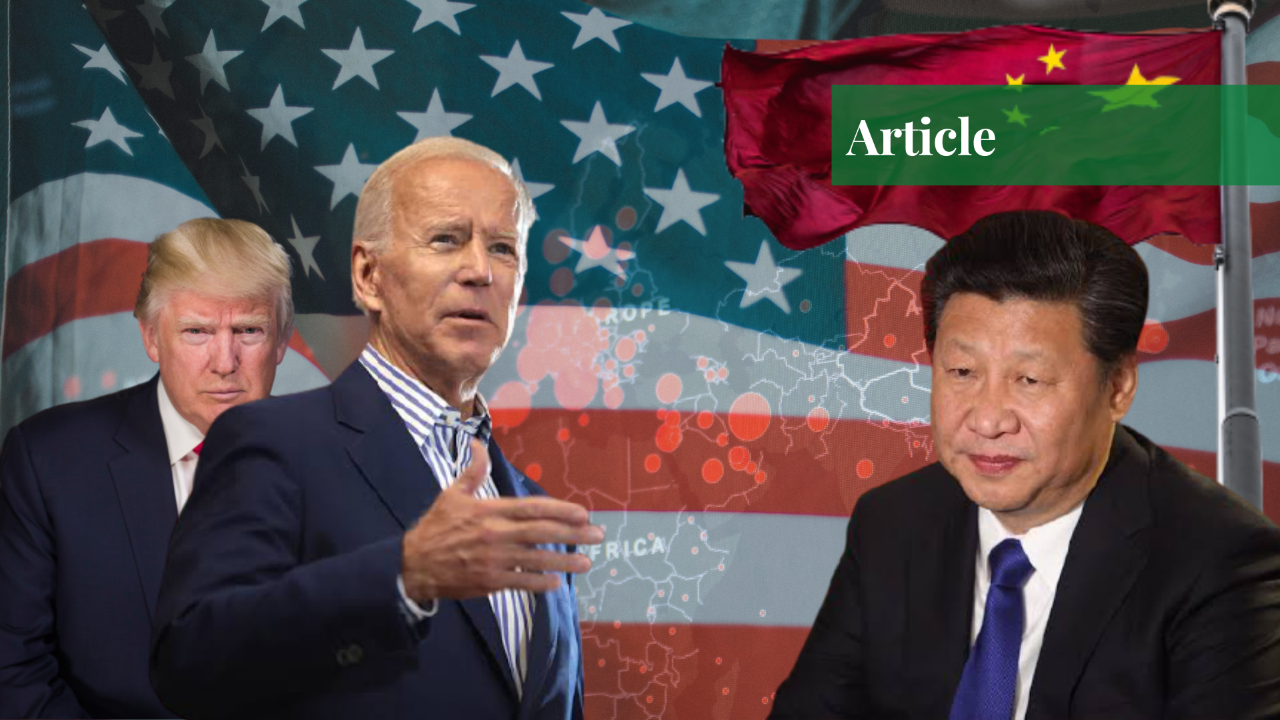Muhammad Abubaker has done his bachelor's in international relations from Bahria University, Islamabad. IHis publications include a piece titled "The emergence of a new Cold War mentality and the role of Quad" and a policy paper titled "The US security leadership in Asia-Pacific and China's countermeasures".
The New Administration
The outcome of the American Presidential election conducted on November 3, 2020, reverberated throughout the world due to its direct impact on the US allies, partners, and international system. The result of America’s election brought a sense of relief for many countries that were directly impacted by President Trump’s harsh and aggressive policies. Experts do not anticipate any major change in the US approach towards China under the Biden administration.
Over the period of the last few months, we have seen a change in terms of rhetoric against China. Instead of leveling racist accusations as Trump did by calling coronavirus a Chinese virus, the Biden administration has redirected anti-China rhetoric towards human rights violations by Beijing. That shows that the Biden administration will try to support a more competitive approach towards China.
On the other hand, Chinese leaders consider that no matter who is in charge of US affairs, America would remain opposed to the rise of China. China fears that Biden who will work closely with its allies in Europe may prove more effective in confronting China’s growing economic and military might. That is evident from the G7 meeting in England under the leadership of President Biden to maintain a firm line against China and to rally allies to counter Beijing on human rights, trade, and technology.
America and China
The relations between the two great powers dwell at an uncertain juncture and it will be more difficult for both countries to step back from their fixed strategic objectives. The tensions between the two countries are running high over a range of issues including the origin of the pandemic, Hong Kong, Taiwan, Xinjiang, East and South China Sea, the revival of Quad, 5G technologies, and trade relations.
The reason behind hostility, tensions, and rivalry is based on America’s suspicion of China; it is afraid of China’s phenomenal economic and military progress. America considers China as its potential rival and threat to its global primacy. The US approach towards China is visible from certain actions like President Joe Biden urging the WHO on 27 May, 2021 to carry out the second phase of its investigation into the origins of the coronavirus by terming the initial investigation as insufficient and inconclusive.
Biden announced that he had ordered the intelligence community to undertake a renewed examination of where the coronavirus came from; a pressuring tactic to force Beijing to cooperate which has further raised the level of confrontation. If we look at the relationship between the two powers through the prism of politics, we can assume that tensions will remain high over the fundamental issues of human rights violations in Xinjiang, suppression of the protests in Hong Kong over democratic rights, and Chinese ambitions towards Taiwan based on ‘One China policy’.
America has been pressing China over human rights violations in Xinjiang and in recent days, it has pushed for a ban on Americans from attending the 2022 Beijing Winter Olympics, a move aimed at damaging the soft image of China through diplomatic boycott. The other major development that also raised the level of friction between America and China was the visit of US officials to the island of Taiwan to announce a vaccination donation and landing by the US Air Force plane’s shortstop in Taiwan.
China reacted harshly and urged the US to stay away from Taiwan. It is important to understand that Beijing is the least flexible over its core national interests. In response, it vowed to protect its sovereignty over Taiwan at any cost. On the economic front, we can assume that the Biden administration will try to challenge China over unequal trade, leadership in Artificial Intelligence, and 5G technologies.
Competition on All Fronts
In order to counter China, the US Senate passed the US Innovation and Competition Act of 2021 on 8 June, 2021 to strengthen its hand in its escalating geopolitical and economic competition with China. Surprisingly, there is also positive news that both countries have resumed their trade talks – a major shift from Trump-era policies. On the military front, America is challenging China over Taiwan, the East, and the South China Sea through the revival of Quad in the region.
The situation in Asia-Pacific is not stable and tensions are rising in the region over different competing claims and national interests. In order to avoid the military dimension, both America and China are trying to set up a crisis hotline (28 May, 2021) to improve dialogue between militaries and to mitigate a potential crisis. There are also chances of cooperation over matters related to climate change that was evident from the participation of Xi Jinping in a US-led climate change summit.
All these developments manifest the trend of extreme competition between America and China. It reveals that suspicion, distrust, and tensions will remain high and there is no question of bonhomie between the two powers. The US-China tensions will persist, but the states will cooperate where matters are of immense importance like climate change and nuclear dimensions.
Pakistan’s Role
Keeping in view the current dynamics between America and China, Pakistan should pursue an independent policy without undermining its national interests. Pakistan needs to use effective diplomacy to clear the US’s anxiety with respect to Pakistan’s cooperation with China. Pakistan should not view the competition between America and China in zero-sum terms in which Pakistan would be compelled to do a balancing act.
The first imperative should be to avoid hostility and to work in the best interests of the country with both America and China simultaneously by taking advantage of its geostrategic location. It is against Pakistan’s national interests to drift away from both America and China. Pakistan is dependent on the American side for military hardware, economic assistance, peace and stability in the region post-US withdrawal from Afghanistan, support for peaceful resolution of the Kashmir issue, and counter-terrorism efforts.
On the other hand, Pakistan’s economic security is directly linked with China, and it can’t abandon CPEC at the behest of the US. China is also vital for Pakistan’s security, sovereignty, and territorial integrity against arch-rival India. Therefore, Pakistan should not be misleading itself by choosing sides in the changing geopolitical environment.
If you want to submit your articles and/or research papers, please check the Submissions page.
The views and opinions expressed in this article/paper are the author’s own and do not necessarily reflect the editorial position of Paradigm Shift.



















